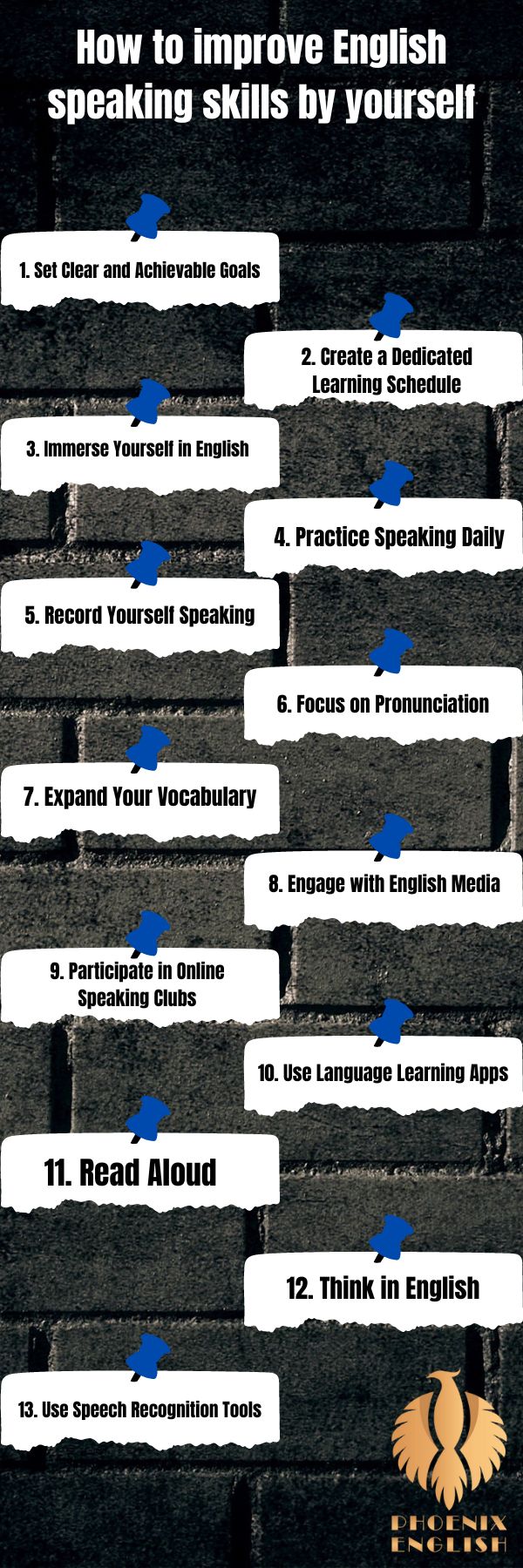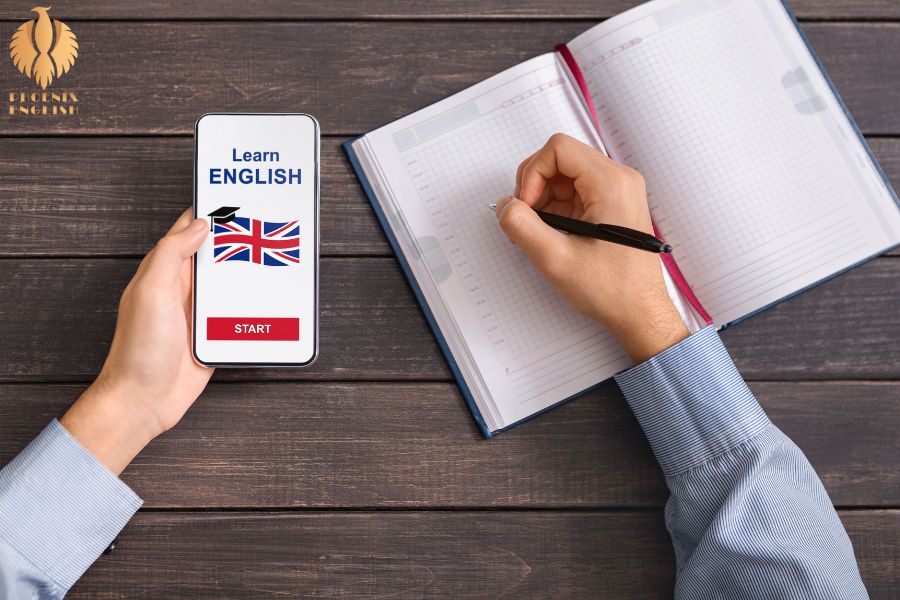My journey to become a better English speaker on my own has been eye-opening and life-changing. These days, you can achieve great success on your own with the wide range of tools and methods at your disposal.
Here are my comprehensive recommendations, based on my own experience, to assist anyone improve their English language proficiency on their own.
Let’s answer the important question now!
How to improve English speaking skills by yourself? First, set clear goals, create a consistent learning schedule, and immerse yourself in the language daily. You need to Practice speaking regularly, record and review your progress, focus on pronunciation, expand your vocabulary, and engage with English media. Finally, online speaking clubs, use language apps, AI bots, and think in English to enhance fluency.
You might also enjoy: Top 100 Commonly Used Verbs That Start With D [2024]

1. Set Clear and Achievable Goals
I discovered early on in my path that it was essential to create specific, attainable goals. I questioned myself what exactly I needed to work on and why I wanted to get better at speaking English.
I might aim to improve my pronunciation of challenging terms or be able to carry on a 10-minute conversation with a native speaker, for instance. These objectives gave me direction and kept me motivated and focused.
2. Create a Dedicated Learning Schedule ⏰
The secret to learning a language is consistency. I made a concentrated study plan that worked with my everyday schedule.
Having a set period of time for English practice, whether it was thirty minutes in the morning or an hour before bed, made sure that I improved steadily.
I approached these meetings as non-negotiable engagements with myself, which aided in developing a methodical strategy.
3. Immerse Yourself in English

Immersion was one of the most effective strategies I used. I surrounded myself with English as much as possible.
This included changing the language settings on my devices to English, reading English news articles, and listening to English podcasts.
The constant exposure helped me get accustomed to the sounds and rhythms of the language, making it easier to reproduce them when speaking.
4. Practice Speaking Daily
Talking to myself on a daily basis changed everything. I developed the practice of using English to tell stories, explain my day, and share my ideas.
Over time, this self-practice increased my fluency and helped me become more at ease with sentence formation.
Additionally, I used applications for language study that offered speaking drills and interactive conversations.
5. Record Yourself Speaking
Making a speech recording of myself was a really useful self-evaluation tool. I listened closely to brief talks, readings, or speeches that I had recorded.
I was able to pinpoint my areas of weakness, which included intonation, fluency, and pronunciation. I could gradually hear my improvement, which was really inspiring.
6. Focus on Pronunciation
Improving my pronunciation was a priority. I used online resources like YouTube tutorials and pronunciation apps to learn how to correctly pronounce difficult words and sounds.
I also practiced with tongue twisters, which were fun and challenging exercises to enhance my articulation and clarity.
7. Expand Your Vocabulary
A rich vocabulary is essential for effective communication. I made it a point to learn new words regularly and use them in sentences. I kept a vocabulary journal where I wrote down new words, their meanings, and example sentences.
Using flashcard apps also helped reinforce my learning. I aimed to learn and actively use at least five new words each week.
8. Engage with English Media
Using English-language media was a big part of my learning experience. I viewed documentaries, TV series, and films in English with subtitles. This made it easier for me to understand the context of the usage of particular words and phrases.
In order to get a better accent and intonation, I also copied the performers speaking. Singing along to English songs while listening to it was a fun method to practice.
9. Participate in Online Speaking Clubs
Joining online speaking clubs and communities provided a platform to practice with other learners.
Websites like Meetup and language exchange platforms offered virtual meetups and conversation sessions.
Engaging in discussions with fellow learners helped me practice speaking in a real-life context and receive constructive feedback.
10. Use Language Learning Apps

Apps for learning languages such as Duolingo, Babbel, and Memrise provided speaking exercises and planned lectures.
These apps are really helpful with regular practice, in my opinion.
They offered interactive instruction, pronunciation manuals, and conversation practice, all of which supported my learning and increased my self-assurance when speaking.
You might also enjoy: Top 100 Commonly Used Verbs That Start With T [2024]
11. Read Aloud
Reading aloud was an excellent way to improve my pronunciation and fluency. I read various materials, including books, articles, and even scripts, aloud.
This practice helped me get comfortable with the flow of English sentences and improved my ability to speak clearly and confidently. It also helped in internalizing the sentence structures and vocabulary.
12. Think in English
Thinking in English was one of the habits that changed me the most. I taught myself to think in English natively, rather than translating my ideas from my home tongue.
As a result, I spoke more naturally and formed sentences faster. It was difficult at first, but after constant repetition, it became increasingly natural.
13. Use Speech Recognition Tools
Speech recognition tools like Google Assistant and Siri were invaluable in practicing my speaking skills. I used these tools to set reminders, ask questions, or have simple conversations.
The immediate feedback on my pronunciation and sentence structure helped me improve and gain confidence in my speaking abilities.
14. Engage in Creative Writing✍️
Writing in English for creative purposes, like poetry, short stories, or journal entries, gave me practice in applying the language in many situations. My writing abilities were enhanced by this activity, but it also
helped me think more clearly and elegantly in English. Receiving feedback and sharing my writing with internet forums was an added bonus.
15. Practice Mindfulness and Relaxation Techniques

Language learning can sometimes be stressful, especially when speaking. I incorporated mindfulness and relaxation techniques like deep breathing and meditation into my routine.
These practices helped me stay calm and focused, reducing anxiety when speaking. A relaxed mind is more receptive to learning
and performing well under pressure.
16. Explore Language Learning Blogs and Forums
I gained useful advice, links, and inspirational tales by reading blogs and engaging in language learning forums.
Websites like Fluent’s blog and Reddit’s language learning community were excellent resources for guidance and motivation. Taking part in these communities helped me stay informed and inspired.
17. Engage in Language Exchange Programs
Language exchange programs allowed me to practice speaking with native speakers. I used platforms like Tandem and HelloTalk to connect with English speakers who were learning my native language.
These exchanges provided practical speaking practice and cultural insights, making the learning process
more immersive and enjoyable.
18. Set Realistic Expectations
Remaining motivated required setting reasonable expectations. I realized that developing fluency would take time and that making errors was a necessary part of the learning process. Rewarding myself for little accomplishments and recognizing my growth kept my spirits up and motivated me to keep moving
forward.
19. Participate in Online Courses and Webinars
Online courses and webinars offered structured learning opportunities. I enrolled in courses on platforms like Coursera, Udemy, and edX, which provided comprehensive lessons on English speaking, listening, and pronunciation.
Webinars hosted by language experts also offered practical tips and interactive sessions to enhance my speaking skills.
20. Engage in Role-Playing Scenarios

I was able to practice speaking in many situations by using role-playing scenarios. I made up scenarios such as making a hotel reservation, placing an order at a restaurant, or delivering a presentation.
My confidence in speaking English in many contexts has increased and my readiness for real-life interactions
has been enhanced by rehearsing these scenarios.
You might also enjoy: Top 100 Commonly Used Verbs That Start With B [2024]
21. Leverage Social Media
Social media platforms like Twitter, Instagram, and Facebook were great for practicing English. I followed pages and accounts that shared content in English and engaged in discussions and comments. This practice helped me use English in informal settings and stay updated with current trends and slang.
22. Join Book Clubs or Reading Groups
Participating in online book clubs or reading groups gave people the chance to talk about books and express their ideas in English.
I was able to get more practice speaking on a variety of subjects, clearly expressing my ideas, and having meaningful conversations thanks to these exchanges. It was also a
fantastic method to come across new authors and books.
23. Use Visualization Techniques
Visualization techniques helped me practice speaking in different scenarios. I imagined myself in various situations, like giving a speech or having a conversation with a friend, and practiced what I would say.
This mental rehearsal helped build my confidence and prepare me for actual speaking situations.
24. Reflect on Your Progress
Reflecting on my progress was an essential part of my learning journey. I regularly reviewed my goals, assessed my achievements, and identified areas that needed improvement.
Keeping a language journal where I documented my experiences, challenges, and successes provided a tangible record of my growth and kept me motivated.
Conclusion
Developing my own English-speaking abilities in 2024 has been a fulfilling and empowering journey. I was able to make great progress by establishing specific objectives, making a timetable for my studies, immersing myself in English, practicing every day, and utilizing a variety of tools and resources. My learning process was enhanced by methods like making videos of myself, concentrating on pronunciation, increasing my vocabulary, interacting with media, and taking part in online communities.
I was also able to become more confident and fluent by forming habits like thinking in English, using speech recognition software, writing creatively, and engaging in mindfulness exercises. Success requires patience, perseverance, and an optimistic outlook.
Rewarding myself for little accomplishments and taking stock of my development helped me stay inspired and driven to keep getting better.
For anyone looking to improve their English-speaking skills independently, I recommend exploring these tips and finding what works best for you.
Remember, language learning is a continuous journey, and with dedication and the right strategies, you can achieve your goals and become a confident English speaker.

Hi, welcome to my blog! My name is Omid and I am thrilled to have you here! I am an English language teacher with 12 years of experience and hold multiple international certifications (TESOL, IELTS, TOEFL, PTE, CELTA). Additionally, I hold a PhD in Applied Linguistics with a specialization in Teaching English as a Second Language (TESL), which fuels my passion for teaching English and assisting others in mastering the language. To me, nothing is more rewarding than helping individuals enhance their English language abilities through various methods. So, let’s embark on this journey of learning English together.




